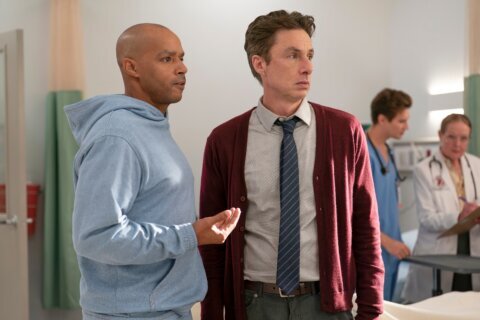WASHINGTON — Two art masterpieces. But room for only one winner in that envelope.
In a cruel twist of cinematic fate, “Boyhood” and “Birdman” arrived the same year in history, creating a “win-win” proposition last night in Los Angeles — or “no-win,” depending how you look at it.
If you’re on Team “Birdman,” you’re strutting and flapping your wings today. That’s because the superhero satire just bagged four Academy Awards, including Best Picture, Best Director (Alejandro G. Inarritu), Best Original Screenplay (Inarritu) and Best Cinematography (Emmanuel Lubezki).
If you’re on Team “Boyhood,” you’re heartbroken, realizing that writer/director Richard Linklater turned in a one-of-a-kind cinematic time capsule and still went home empty handed, the victim of peaking too early this award season as the “inevitable” frontrunner.
If, however, you’re a fan of neither movie — our listener complaints have ranged from “bizarre” to “boring” — I beg you to revisit both movies with a new mindset.
For “Boyhood,” you need to tell yourself you’re going to watch a series of “slice of life” moments where the filmmaker resists the temptation to make “things happen.” There’s no catalyst that sends the hero off on a journey to fight the villain and save the day. It is meant to be a document of everyday life, a series of moments that appear insignificant, but when added up, create something profound.
For “Birdman,” you must watch for the “single take,” the idea that the entire movie is done in one continuous shot (i.e. the camera never cuts). In this light, there’s no way you’ll lose interest, because you’ll be constantly counting the trickery. At one moment, Ed Norton is on the catwalk. The next, he is suddenly down on stage. All in the same shot. You’ll ask, “How did they do that?”If you’re bored, it’s not because the film isn’t giving you enough; it may be because you’re not giving enough to the film.
And so, we have two works of art doing battle when both deserve Best Picture. If only Linklater conducted his experiment over 13 years instead of 12, so he didn’t have to go up against Inarritu.
As screenwriter, Inarritu stole Original Screenplay from both Linklater’s “Boyhood” and Wes Anderson’s”The Grand Budapest Hotel,” which won four Oscars, mostly in the art department.
As director, Inarritu made it back-to-back wins for Mexican directors working with Lubezki. You’ll recall Alfonso Cuaron won for “Gravity” by opening with a mesmerizing 20-minute single take. Inarritu and Lubezki took it a step further this year in “Birdman,” creating the illusion of one continuous shot the entire movie. This feat alone makes “Birdman” deserving of its Best Picture glory. It also didn’t hurt that the largest block of Academy voters is made up of actors, who dig ensemble casts like Michael Keaton, Emma Stone, Ed Norton, Zach Galiafanakis, Amy Ryan, Naomi Watts.
Hollywood also loves rewarding movies about itself, having given Best Picture to showbiz movies in three of the past four years: “The Artist” (2011), “Argo” (2012) and now “Birdman” (2014), which captured the zeitgeist by satirizing Hollywood’s obsession with superhero movies. While “Sunset Blvd”mocked Hollywood and “All About Eve” mocked Broadway, “Birdman” had the guts to mock both, creating a masterful commentary on highbrow art vs. mainstream entertainment.
As for “Boyhood,” the instant classic was relegated to a single Oscar: Patricia Arquette for Supporting Actress. Even then, young Ellar Coltrane got stiffed when he ran down the aisle to give her a hug.
https://www.youtube.com/watch?v=jNzsAhKmnV8
Any other year, this would have also been a lock for “Boyhood” dad Ethan Hawke for Supporting Actor, but he ran into the buzzsaw of J.K. Simmons in “Whiplash” (2014). The Sundance champ also won for Film Editing and Sound Mixing, thanks to precision cuts on syncopated music beats.
https://www.youtube.com/watch?v=nbITkAWZkJs
As for the lead actor categories, Julianne Moore won for portraying Alzheimer’s in “Still Alice,” while Eddie Redmayne won for portraying ALS as Stephen Hawking in “The Theory of Everything.” Both performances were fantastic, even if they reinforce the old stereotype that the way to the Oscar is simply to play someone with a handicap or disease (“My Left Foot,” “Rain Man,” “Forrest Gump”).
https://www.youtube.com/watch?v=eM14BdfWQVc
Moore’s win was likely a make-up award for an array of past snubs, from “Magnolia” (1999) to “The Kids Are All Right” (2010), robbing Rosamund Pike from what was a legendary role in “Gone Girl.” Likewise, Redmayne’s win ruined the superhero comeback of Michael Keaton, who suffered the same Oscar fate as Mickey Rourke in “The Wrestler” (2008), while Bradley Cooper (“American Sniper”), Benedict Cumberbatch (“The Imitation Game”) and Steve Carell (“Foxcatcher”) were left cold.
All had to breathe a sigh of relief knowing that the rightful winner — David Oyelowo as Martin Luther King Jr. in “Selma” — wasn’t even nominated. The film only has itself to blame, thanks to a terrible award season push that failed to send screener DVDs to the various voting guilds. What a shame.
“Selma” did, however, pick up a win for Best Original Song with the John Legend-Common collaboration “Glory.” The live rendition brought Oscar guests to tears, from Oyelowo to Chris Pine.
https://www.youtube.com/watch?v=U0FJy67C3pw
Other live numbers included Adam Levine’s “Lost Stars” from “Begin Again” and Lady Gaga’s “Sound of Music” tribute, earning a standing ovation and the praise of Julie Andrews.
https://www.youtube.com/watch?v=NLH57pFhAkY
Not to be outdone, host Neal Patrick Harris also offered a song-and-dance number in his opening monologue, featuring nostalgic movie references and a comical interruption by Jack Black.
https://www.youtube.com/watch?v=Ju4_StUDlKo
Still, perhaps the best non-awards moment came when John Travolta and Idina Menzel conducted a “do-over” from last year’s Adelle Dazeem flub:
https://www.youtube.com/watch?v=15ZNK4MVn_4
The best speech award went to Graham Moore, who won Best Adapted Screenplay for “The Imitation Game,” then proceeded to share his suicide attempt to inspire other youngsters not to feel outcast. The irony was palpable as Robin Williams graced the “In Memorium” segment.
https://www.youtube.com/watch?v=kN1SaF5LNGs
And so, another year of Oscar history is in the books. As always, we take the winners with a grain of salt, understanding the limitations of short-sighted Oscar politics. And yet, we revel in the joy of devoting an entire night to the movies — especially two movies that remind us that cinema can be more than entertainment; it can rise to the greatest art form ever invented.








